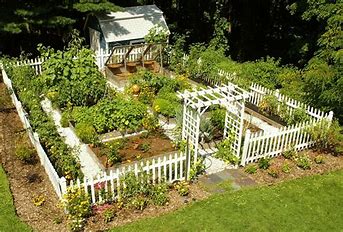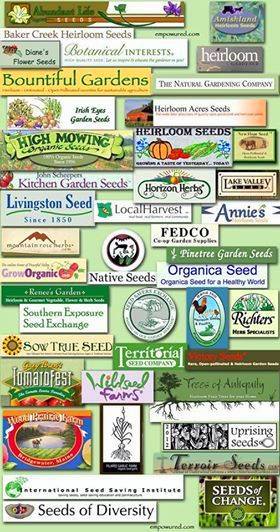Keep Monsanto OUT of Your Garden

Have you unknowingly invited Monsanto to your garden party? Updated from 2013.
In 2005, Monsanto grabbed 40% of the U.S. seed market and 20% of the global seed market when it bought out Seminis, making them the largest seed company in the world. —supplying the genetics for 55% of the lettuce on U.S. supermarket shelves, 75% of the tomatoes, and 85% of the peppers, with strong holdings in beans, cucumbers, squash, melons, broccoli, cabbage, spinach and peas! (source)
And Monsanto has been buying up every seed company they can ever since. By going to the Seminis site, you can see their history of acquisitions. You can see Syngenta and Dow are doing the same.
Apparently, Monsanto is now legally registered or established to hold the trademark for a plethora of the named heirloom seed varieties. (See a list of names below.) This company has strategically positioned itself to profit from the growing heirloom or open-pollinated home-gardening market.
Bayer, Monsanto and Their Terrible Little Secrets
First, as of “2015, the Bayer takeover of Monsanto merges a chemical giant with a seed giant and leaves the control of the world’s food supply in too few hands. The merger also links two key parts of agricultural production, reducing competition in the food chain. Bayer is now expected to control 29 per cent of the global seed market and 24 per cent of the global pesticide market.
“Second, there are serious concerns about increased farmer dependency on a smaller number of suppliers, and higher prices due to weak competition.
“Third, the deal increases the power of an even smaller group of companies over the intellectual property, and patents that already lock up much of the world’s commercially produced food supply. The patents weaken farmers’ ability to use and reuse their own seeds.”
“Finally, there are ongoing food health and safety concerns related to the seeds and chemicals produced by these companies. Increasing their market share increases their power over the market and over the producers and consumers that use their products. In 2015, the World Health Organisation declared glyphosate, the active ingredient in Monsanto’s herbicide, Roundup, as “probably carcinogenic in humans,””(source)

1.) Avoid buying anything from companies that are affiliated with Monsanto or Seminis. You can search the companies they do business with to avoid them as they are potentially compromised.
2.) Avoid buying seed or seedlings varieties that are trademarked and owned by Seminis or Monsanto. This includes popular tomato varieties such as ‘Early Girl’, ‘Better Boy’, and ‘Burpee’s Big Boy’, as well as a host of other common home garden varieties like ‘Habanero’ hot pepper and ‘Packman’ broccoli. These are not GMO varieties, but their purchase does profit Monsanto.
3.) Ask seed companies if they have taken the Safe Seed Pledge and tested their stock for GMOs. Here’s a list.
4.) Purchase, plant, and save seeds from heirloom varieties. We need to support Baker Creek Heirloom Seeds, Seed Savers Exchange, and Clear Creek Heirloom Seeds and others that specialize in heirlooms and that are NOT owned by Monsanto or Seminis. The legacy of Seed Saver’s Exchange is to tell you how to collect and store seeds.